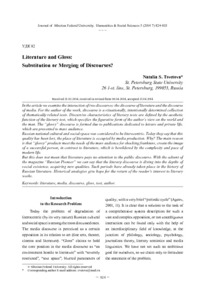Literature and Gloss: Substitution or Merging of Discourses?
Скачать файл:
URI (для ссылок/цитирований):
https://elib.sfu-kras.ru/handle/2311/10367Автор:
Tsvetova, Natalia S.
Цветова, Н.С.
Дата:
2014-05Аннотация:
In the article we examine the interaction of two discourses: the discourse of literature and the discourse
of media. For the author of the work, discourse is a situationally, intentionally determined collection
of thematically related texts. Discursive characteristics of literary texts are defined by the aesthetic
function of the literary text, which specifies the figurative form of the author’s view on the world and
the man. The “glossy” discourse is formed due to publications dedicated to leisure and private life,
which are presented to mass audience.
Russian national cultural and social space was considered to be literocentric. Today they say that this
quality has been lost, the place of literature is occupied by media production. Why? The main reason
is that “glossy” products meet the needs of the mass audience for shocking frankness, create the image
of a successful person, in contrast to literature, which is bewildered by the complexity and pace of
modern life.
But this does not mean that literature pays no attention to the public discourse. With the advent of
the magazine “Russian Pioneer” we can say that the literary discourse is diving into the depths of
social existence, acquiring new qualities. Such periods have already taken place in the history of
Russian literature. Historical analogies give hope for the return of the reader’s interest to literary
works В статье рассматривается взаимодействие двух дискурсов: дискурса литературы и
медийного. Дискурс для автора работы – ситуативно, интенционально обусловленная
совокупность тематически родственных текстов. Дискурсивные характеристики
литературных текстов определяются эстетической функцией литературного текста,
которая задает образную форму воплощения авторского видения мира и человека.
“Глянцевый” дискурс формируется изданиями транснациональными, обращенными к
массовой аудитории, посвященными досугу и приватной жизни.
Русское национальное культурное и социальное пространство считалось
литературоцентричным. Сегодня говорят, что это качество утрачивается, место
литературы занимает медийная продукция. Почему? Главная причина – “глянец”, в отличие
от растерявшейся перед сложностью и темпами современной жизни литературы, отвечает
потребности массовой аудитории в эпатажной откровенности, создает образ успешного
человека.
Но это не значит, что литература навсегда уходит из публичного дискурса. С появлением
журнала “Русский пионер” можно говорить о том, что литературный дискурс, сворачиваясь,
обретая новые качества, уходит в глубины общественного бытия. Такие периоды в истории
русской литературы уже были. Исторические аналогии дают надежду на возвращение
интереса читателей к литературному творчеству

